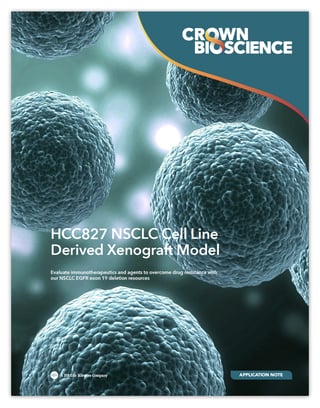- Our Services
- Platforms
- Target Solutions
- Technologies
- Service Types
- Our Science
- About Us
- Contact us

The HCC827 Non Small Cell Lung Cancer Cell Line (NSCLC) Derived Xenograft model contains an adenocarcinoma cell line which harbors an activating EGFR mutation in exon 19. This mutation, which occurs in approximately 48% of all EGFR-mutated NSCLC cases, confers increased sensitivity to EGFR tyrosine Kinase Inhibitors (TKIs), which has been validated in HCC827. This model also exhibits high expression of PD-L1, which can lead to cancer immune escape. These features of the HCC827 makes it a relevant model for NSCLC preclinical studies.
Positive clinical responses to EGFR mutated NSCLC cases using EGFR TKIs are observed, but after 10-16 months of treatment, drug resistance to EGFR TKIs commonly occurs, resulting in patient relapse. Crown Bioscience generated drug-resistant models of HCC827 via continuous exposure to specific EGFR TKIs and identified the mechanism of resistance in these models. These models have been subsequently used in preclinical development studies of new treatments for drug-resistant NSCLC cases.
Lack of immunotherapy models is a major challenge in developing improved immunotherapeutic treatments. The high expression of PD-L1 in model HCC827 makes it a suitable model for immunotherapeutic studies. By using the Crown Bioscience MiXenoTM platform, a HCC827 model with transient human immunity was generated to allow for evaluation of anti-PD-1 and anti-PD-L1 checkpoint inhibitor treatment.
Your privacy is important to us.
We'll never share your information.
© 2025 Crown Bioscience. All Rights Reserved.
Privacy Policy | Imprint | Terms of Service | Privacy Preferences


© 2025 Crown Bioscience. All Rights Reserved. Privacy Policy
2025-05-07
2022-03-10
landing_page
In Vivo: CDX and Syngeneics